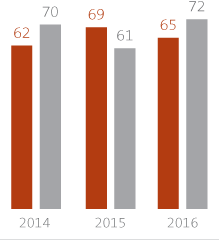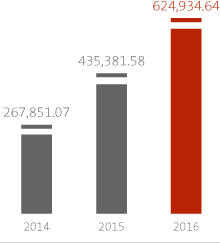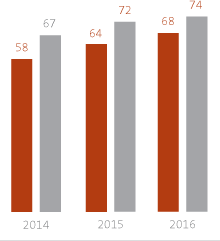Natural capital
The incorporation of natural capital in CCR Group's business strategy demonstrates our commitment to managing environmental aspects. We work to continually improve our environmental performance through structured programs and specific targets and action plans to reduce water and electricity consumption, greenhouse gas (GHG) emissions and waste.
ISE PERFORMANCE – ENVIRONMENTAL DIMENSION


Water
Water management, a material issue for the company, has been improved through initiatives in recent years to reduce consumption and maximize recycling.
CCR Group is committed to maintaining or reducing water consumption in our operations year on year. Water reduction mal water recycling target has been initiatives in 2016 included:
- preventive and corrective maintenance to detect and repair any leaks in our water systems and installations;
- reducing vehicle wash frequency at our operations bases;
- placing padlocked enclosures around water hoses to avoid inappropriate use;
- instructing cleaning staff not to hose down their working areas as a cleaning method;
- water crisis management procedures at ViaQuatro.
WATER CONSUMPTION
(m3)
Energy
One of our identified material issues for creating value is energy management and energy efficiency initiatives. CCR EngelogTec is responsible for energy efficiency studies and programs Groupwide.
A number of energy-saving initiatives were implemented in 2016, including:
- lamps: replacement of tubular, compact fluorescent, dichroic, sodium and metal vapor lamps with equivalent LED lamps in office buildings, operations bases and AVISs;
- Air-conditioning: switching off the hot air function on all air conditioners in the workplace; timing air-conditioners to switch off at 8 pm each day and back on at 7 am the next day; and awareness campaigns on setting temperatures from 23º to 25º; and a number of awareness announcements to all employees, which appear as Internet links as soon as employees log on to their workstations.
24,087.27 GJ
in fuel consumption in commuting
3.82%
in energy savings
Emissions
We have accounted for greenhouse gas (GHG) emissions from our business activities since 2012, and prepare Greenhouse Gas Emissions Inventories in accordance with the GHG Protocol.
Recognizing the importance of the issue, in 2014 CCR Group established a Corporate Policy on Climate Change with guidelines and principles to achieve defined goals.
Among the Company's initiatives to reduce GHG emissions are the following:
- We developed a Pilot Plan on Climate Change Adaptation for operations in the state of Rio de Janeiro (CCR Barcas and CCR ViaLagos). In 2016 the Plan was expanded to other highways and a methodology was implemented to identify critical issues in each operation in light of extreme climate events that have occurred over the past five years;
- We measured the Carbon Footprint of our toll roads in 2016;
- We became a signatory of the Open Letter to Brazil on Climate Change in 2015, reinforcing our climate-change commitments to companies, government and Brazilian society. We voluntarily declared our GHG emissions to the state environmental agencies of Paraná and São Paulo under State Climate Protocols;
- We have actively participated in forums on climate change and have followed legislation developments in the states and countries where we operate;
- We have supported industry organizations, governments and companies in their climate change efforts.
Climate change adaptation program
Since 2014, CCR Group has worked in partnership with the São Paulo Getulio Vargas Foundation's Companies for Climate Platform to develop a Climate Change Adaptation Plan. The pilot program will initially be implemented at CCR Barcas and CCR ViaLagos – which are located in priority geographies – and may later be expanded to other business units.
As a result of this joint effort, the company designed its own strategy to adapt its operations to climate change, which was then translated into operations plans in 2016 with a focus on internal engagement. Another deliverable from the program was an online publication titled Climate Change Adaptation and Business, which presents concepts and references to support other companies in engaging with the issue.
ISE PERFORMANCE – CLIMATE CHANGE DIMENSION


Waste and wastewater
Waste and wastewater are another issue that is material to CCR Group. To ensure adequate waste management procedures are in place, in 2015 we implemented a Corporate Standard designed to help new businesses prepare Solid Waste Management Plans in accordance with applicable regulations.
Among our initiatives are waste segregation and conscientious consumption campaigns using internal communications and literature to raise employee awareness about the responsible use of office materials such as paper, paper towels and disposable cups.
Our concessionaires monitor wastewater volumes through an information system called Cerensa. Because the wastewater generated from most of our operations is essentially domestic wastewater, in 2016 most wastewater was disposed of in municipal sewage systems. Although the company is committed to complying with environmental regulations, no formal wastewater targets have been established.
TOTAL WATER DISCHARGE BY QUALITY AND DESTINATION
(m3)| 2016 | |
| Disposed of in municipal sewage systems | 203,178.00 |
| Septic tanks | 67,268.25 |
| Stabilization ponds | 178,899.60 |
| Anaerobic reactors | 6.56 |
| Seepage pits | 1,200.15 |
| Total disposal | 450,552.41 |
TOTAL WEIGHT OF WASTE BY TYPE AND DISPOSAL METHOD*
(t)| NONHAZARDOUS WASTE | ||
| 2015 | 2016 | |
| Composting | - | 278.75 |
| Reutilization | - | 0.24 |
| Reutilization | 90,040.59 | 91,514.63 |
| Recovery (including energy recovery) | 1.13 | 5.09 |
| Incineration (mass burn) | 22.45 | 4.43 |
| Landfill | 10,307.42 | 16,970.10 |
| Other | 285.16 | 266.48 |
| Total | 100,656.75 | 933,039.72 |
| HAZARDOUS WASTE | ||
| Recycling | 426.08 | 366.49 |
| Incineration (mass burn) | 3.06 | 4.21 |
| Landfill | 30.9 | 159.85 |
| Other | 149.83 | 313.02 |
| Total | 609.87 | 843.57 |
*Disposed of directly by the reporting organization or by third parties, provided it is confirmed directly by the reporting organization.
Biodiversity
The primary impacts from the company's activities on biodiversity are related to expansion works. To mitigate these impacts, the company develops and implements initiatives such as tree planting programs.
CCR Group is committed to mitigating impacts on fauna and flora wherever possible. Licensable activities, depending on the degree of complexity, require specific assessments of impact on wildlife, in addition to other requirements.
CCR Group's primary impacts on biodiversity are related to infrastructure expansion projects and include the need to occupy land areas and modify their land cover and land use, which often involves clearing native vegetation, drainage, alteration of the landscape and waterproofing of soil. Projects can also consume resources and generate waste. These impacts can potentially result in: Loss of habitat and plant species; alteration of soil dynamics (erosion and silting), shortages of resources (despite our minor water and energy requirements); and waste, thermal and sound pollution.
6,700
saplings will be replanted around the subway
learn more
About CCR Group’s performance on natural capital, view the full report here.

